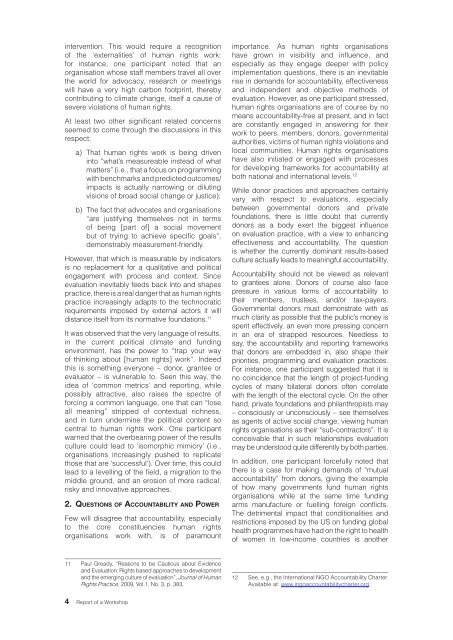No Perfect Measure: Rethinking Evaluation and ... - The ICHRP
No Perfect Measure: Rethinking Evaluation and ... - The ICHRP
No Perfect Measure: Rethinking Evaluation and ... - The ICHRP
Create successful ePaper yourself
Turn your PDF publications into a flip-book with our unique Google optimized e-Paper software.
intervention. This would require a recognition<br />
of the ‘externalities’ of human rights work:<br />
for instance, one participant noted that an<br />
organisation whose staff members travel all over<br />
the world for advocacy, research or meetings<br />
will have a very high carbon footprint, thereby<br />
contributing to climate change, itself a cause of<br />
severe violations of human rights.<br />
At least two other significant related concerns<br />
seemed to come through the discussions in this<br />
respect:<br />
a) That human rights work is being driven<br />
into “what’s measureable instead of what<br />
matters” (i.e., that a focus on programming<br />
with benchmarks <strong>and</strong> predicted outcomes/<br />
impacts is actually narrowing or diluting<br />
visions of broad social change or justice);<br />
b) <strong>The</strong> fact that advocates <strong>and</strong> organisations<br />
“are justifying themselves not in terms<br />
of being [part of] a social movement<br />
but of trying to achieve specific goals”,<br />
demonstrably measurement-friendly.<br />
However, that which is measurable by indicators<br />
is no replacement for a qualitative <strong>and</strong> political<br />
engagement with process <strong>and</strong> context. Since<br />
evaluation inevitably feeds back into <strong>and</strong> shapes<br />
practice, there is a real danger that as human rights<br />
practice increasingly adapts to the technocratic<br />
requirements imposed by external actors it will<br />
distance itself from its normative foundations. 11<br />
It was observed that the very language of results,<br />
in the current political climate <strong>and</strong> funding<br />
environment, has the power to “trap your way<br />
of thinking about [human rights] work”. Indeed<br />
this is something everyone – donor, grantee or<br />
evaluator – is vulnerable to. Seen this way, the<br />
idea of ‘common metrics’ <strong>and</strong> reporting, while<br />
possibly attractive, also raises the spectre of<br />
forcing a common language, one that can “lose<br />
all meaning” stripped of contextual richness,<br />
<strong>and</strong> in turn undermine the political content so<br />
central to human rights work. One participant<br />
warned that the overbearing power of the results<br />
culture could lead to ‘isomorphic mimicry’ (i.e.,<br />
organisations increasingly pushed to replicate<br />
those that are ‘successful’). Over time, this could<br />
lead to a levelling of the field, a migration to the<br />
middle ground, <strong>and</strong> an erosion of more radical,<br />
risky <strong>and</strong> innovative approaches.<br />
2. Questions of Accountability <strong>and</strong> Power<br />
Few will disagree that accountability, especially<br />
to the core constituencies human rights<br />
organisations work with, is of paramount<br />
importance. As human rights organisations<br />
have grown in visibility <strong>and</strong> influence, <strong>and</strong><br />
especially as they engage deeper with policy<br />
implementation questions, there is an inevitable<br />
rise in dem<strong>and</strong>s for accountability, effectiveness<br />
<strong>and</strong> independent <strong>and</strong> objective methods of<br />
evaluation. However, as one participant stressed,<br />
human rights organisations are of course by no<br />
means accountability-free at present, <strong>and</strong> in fact<br />
are constantly engaged in answering for their<br />
work to peers, members, donors, governmental<br />
authorities, victims of human rights violations <strong>and</strong><br />
local communities. Human rights organisations<br />
have also initiated or engaged with processes<br />
for developing frameworks for accountability at<br />
both national <strong>and</strong> international levels. 12<br />
While donor practices <strong>and</strong> approaches certainly<br />
vary with respect to evaluations, especially<br />
between governmental donors <strong>and</strong> private<br />
foundations, there is little doubt that currently<br />
donors as a body exert the biggest influence<br />
on evaluation practice, with a view to enhancing<br />
effectiveness <strong>and</strong> accountability. <strong>The</strong> question<br />
is whether the currently dominant results-based<br />
culture actually leads to meaningful accountability.<br />
Accountability should not be viewed as relevant<br />
to grantees alone. Donors of course also face<br />
pressure in various forms of accountability to<br />
their members, trustees, <strong>and</strong>/or tax-payers.<br />
Governmental donors must demonstrate with as<br />
much clarity as possible that the public’s money is<br />
spent effectively, an even more pressing concern<br />
in an era of strapped resources. Needless to<br />
say, the accountability <strong>and</strong> reporting frameworks<br />
that donors are embedded in, also shape their<br />
priorities, programming <strong>and</strong> evaluation practices.<br />
For instance, one participant suggested that it is<br />
no coincidence that the length of project-funding<br />
cycles of many bilateral donors often correlate<br />
with the length of the electoral cycle. On the other<br />
h<strong>and</strong>, private foundations <strong>and</strong> philanthropists may<br />
– consciously or unconsciously – see themselves<br />
as agents of active social change, viewing human<br />
rights organisations as their “sub-contractors”. It is<br />
conceivable that in such relationships evaluation<br />
may be understood quite differently by both parties.<br />
In addition, one participant forcefully noted that<br />
there is a case for making dem<strong>and</strong>s of “mutual<br />
accountability” from donors, giving the example<br />
of how many governments fund human rights<br />
organisations while at the same time funding<br />
arms manufacture or fuelling foreign conflicts.<br />
<strong>The</strong> detrimental impact that conditionalities <strong>and</strong><br />
restrictions imposed by the US on funding global<br />
health programmes have had on the right to health<br />
of women in low-income countries is another<br />
11 Paul Gready, “Reasons to be Cautious about Evidence<br />
<strong>and</strong> <strong>Evaluation</strong>: Rights based approaches to development<br />
<strong>and</strong> the emerging culture of evaluation”, Journal of Human<br />
Rights Practice, 2009, Vol.1, <strong>No</strong>. 3, p. 383.<br />
12 See, e.g., the International NGO Accountability Charter.<br />
Available at: www.ingoaccountabilitycharter.org.<br />
4 Report of a Workshop

















